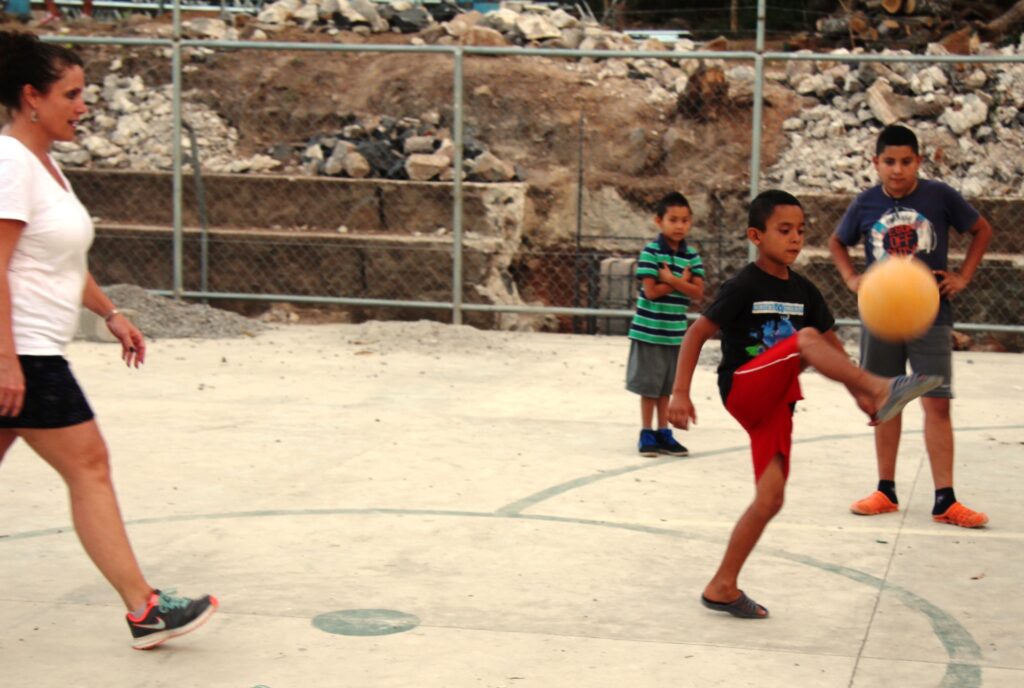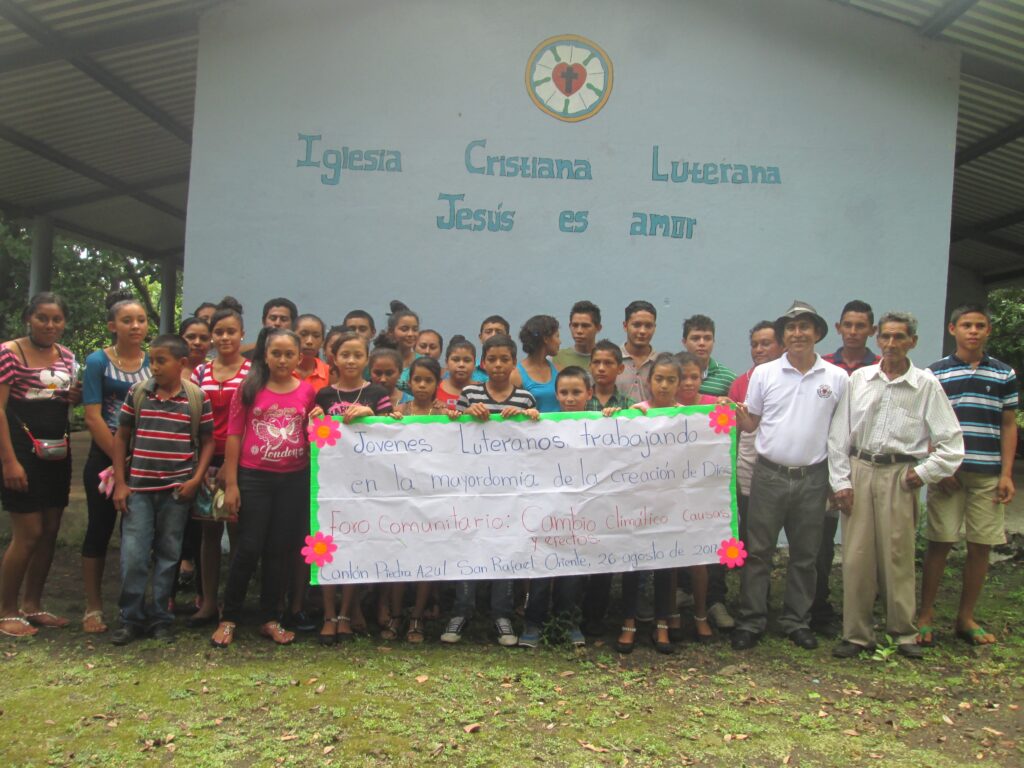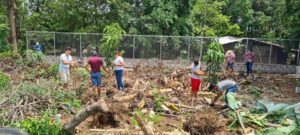“I discovered a theology of life during the middle of an earthquake!”
Esta historia se escribe en Español = This story is also written in Spanish here
Editor’s Note: The date January 13, 2001, is etched in the memory bank of anyone living in El Salvador at that time. The earthquake’s 7.6 (or 7.9) magnitude on the Richter scale caused heavy loss of life (nearly 1,000) and massive property destruction. Here is the BBC story that appeared that day:
http://news.bbc.co.uk/onthisday/hi/dates/stories/january/13/newsid_2554000/2554149.stm
Stories of survival by countless friends of ours are generally ones of heroics, physical strength, and individuals and community groups working together to assist in the aftermath.
Donal’s story is a bit different. It seems the earthquake came at the time when he was 27 and was beginning to feel a call to ministry. This experience of assisting in the aftermath of this earthquake crisis “shook” Donal’s spirituality into action. Soon afterwards he pursued enrollment in seminary. He continues to feel a stronger call to ministry every day.

My family supports my call to ministry. I am one of six siblings who were born in the western most department of the country, Ahuachapan on the Guatemala border, and was raised Lutheran. My dad wanted to name me Ronald after Ronald Reagan, but he made a mistake. Now I live in one of the eastern departments, San Miguel, in a small canton called Piedra Azul.
As a child I always enjoyed sports – particularly riding horses and bulls – and loved all of God’s creation, which I find precious – the mountains, rivers and which I still spend time visiting. Some of those early interests continue to drive my ministries today.

I met my wife, Roxanna, in 2004 as a member of the Lutheran youth. We began dating and then became engaged before living together and planning our married life.
Life has not been without difficulties. Roxanna and I made the decision to have two children. When she became pregnant with our first child and was studying social work at Lutherano University, doctors diagnosed her with a heart condition. This required her to drop out of school to get treatment. Although the doctors felt the baby was not at risk, this was not true. Roxanna gave birth to our son when only five months pregnant. The doctors told us he would not live because he was not developed enough. He was placed in the NICU for three months due to immature lung development, etc. By what we consider to be a miracle, our son did live. After he was discharged from the hospital, our lives revolved around the schedules of his many therapies. He now continues to have residual coordination issues but has a great personality, and we love him. Eight years later we had a little girl who had no neonatal or birth difficulties at all. We give thanks for our two children.
Getting involved in helping those affected by the severe 2001 earthquake that unexpectedly hit El Salvador was the defining moment propelling me toward the ministry. I had been feeling a call to serve, but when I began working with so many within and outside the church in a coordinated relief effort was what sealed the deal for me. It was seeing Christ and life as the center of the theology of life doctrine put into action for me.
I knew I wanted to become a pastor but had no one to sponsor me in my theology training at Lutherano University and so paid the equivalent of out-of-country tuition fees for three and a half years on my own. I paid for this by working in the Lutheran synod office as a caretaker of the buildings. Bishop Gomez paid me. Additional courses I took were in Germany, Honduras, Costa Rica, and Guatemala. My specialty was Psychotraumatology and the role of the pastor.
Three things within the Lutheran Church appealed to me in terms of my wanting to serve in it: (1) to see [observe what is happening] (2) judge [witness] (3) act [on how to help].
The basis of my ministry relates to these three characteristics. For example, right now I have two major goals in my ministry: (1) to empower the youth and (2) to prevent violence. They are based on what I see/observe, on what I am judging or witnessing needs to happen, and on how I feel we need to act on them.
Living in a poor community in which most people make their living through agriculture, the majority of youth attend school through sixth or ninth grade and then quit to help their families work in the fields. Members of the congregation and I are working to empower the youth to see a broader vision, emprendedurismo, of what they can be beyond the expectations of life in the fields. One of my strategies has been to utilize the professionals within the congregation – a professor, a legislator, a sociologist- as models of professions they might aspire to in terms of improving their community and to see God’s vision for them. It is to see more than one option in their life. As a result we now have a boy working in communications, a girl in theology, and another in engineering. All are receiving financial support from various sources, so we are starting to reap some benefits. In turn they serve as catalysts for others. One student became a barber who received his tools of the trade from the Lutheran World Relief, another student went into cosmetology, and a third works in hotel tourism.

A problem beyond motivating students is a practical one – that of cost. Besides tuition, rural students have a disadvantage of additional costs of transportation and meals to cover in order to get into the cities where their classes meet. Even that simple $6 a day multiplied over a month adds up to $120 which is a staggering fee and cost prohibitive for most rural Salvadoran youth without a sponsor.
Addressing the second major goal of my ministry to prevent violence includes working WITH gangs rather than avoiding them. In fact, we welcome gang members from outside the community to join us. We keep our youth busy by creating options such as sports and by providing an environment of peace. We work with community leaders in three other geographical areas to plan, coordinate, and design our efforts to be consistent in our approach. We understand that there are varied reasons some youth join gangs and see our role as working with rather than being in an adversarial role with them. We offer positive activities and outlooks as an option.

Besides our “Jesus is Love” Lutheran church in my community of Piedra Azul, there are an Assembly of God Church, Roman Catholic Church, and Jehovah’s Witness Church. Our church comprises 70 families with about 100 worshipers on an average Sunday. Some Salvadoran churches do not take up an offering, but I’ve tried to create a conscience within our congregation of giving. The members are poor but give enough to cover the cost of the wine and bread for Holy Communion, as well as a few other basic needs within the church. A committee administers the offerings; the pastor never sees the money. Every three months the committee shares how the offerings are spent. It is all very transparent. That is how I was taught in seminary.

Our church once had a sister congregation outside Milwaukee, Wisconsin. Both congregations signed a covenant of support. However, I believe the pastor of that church left, and the relationship no longer exists.
(When asked to self-reflect on his gifts, Donal’s response was . . . “service, solidarity, spirituality, and sharing.” My hopes for my church are to continue to grow and stay united. My hopes for my country are that a leader will solve the problems of violence.
I feel El Salvador’s greatest assets are its resilient people and the good people. Even wealthy people can be good at heart including those like San Salvador’s then mayor, now president, Nayib Bukele, who donates his salary to scholarships rather than accept salary. (Note: This may have changed since he was elected president.)
Editor’s Note: We ask virtually EVERY person we interview how they believe the gang situation should be handled. Some want the military to exterminate them. Others want them all tossed in prison, and throw away the keys. Some want to reform them. Others expect the military or elected leaders to come up with a viable solution. Some want to avoid their turf. Some simply pay the extortion fee gangs demand in order to survive.
Donal is the FIRST person who was tolerant of their existence; understanding of those who join; and welcoming of them into the activities of his church youth as a positive option for gang members. He and his three colleagues working together are using the accompaniment model of mission. This was such a refreshing approach. One can only wish them success.

Pastor Emeritus Donald Seiple, Donal Monroy, Luis Leonard


